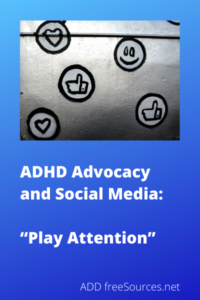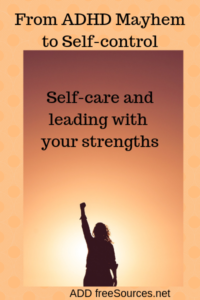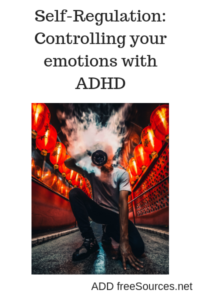Once again, the New Year has come and gone without any action on my part to name any “resolutions”. My ideas for goals are still rolling around in my brain with no specific starting date, commitment, or accountability. For now, the ideas are flowing and hope sustains me. That will have to be enough.
I’m taking my own advice again this month, better late than never. I’ve also written another post full of resources for you to explore. Writing these newsletters, with long posts full of resources to explore has never been easy for me nor really very popular. But ADHD advocacy is what gets me up in the morning and collecting information, sharing, and offering support is what I do best. Turns out there’s even a name for it. Curation.
(Google definition: cu·ra·tion – /kyəˈrāSHən/ – the selection, organization, and presentation of online content, merchandise, information, etc., typically using professional or expert knowledge.)
I saw a cartoon last week with two characters talking. The first one asks, “Why do you think that 2020 will be better? The second replies, “There will be flowers.” The skeptical creature retorts, “There are always flowers. What makes this year any different? Then, looking over the other’s shoulder, he wonders, “What’s that you are doing? Our optimistic fellow simply answers, “I’m planting flowers.”
And therein lies my both my dilemma and my hope. Choosing wrong will have consequences – adding yet another failure to my already sketchy history. My coach, Jennie Friedman, recommends first imagining how the “flowers” or goals will look and feel when achieved. What will success look like? What’s in it for you? Why is it worth the effort? The stronger your picture, the more likely it is that you will be enjoying your own garden this year.
For those with ADHD, setting a goal is just one of many decisions. Making it happens requires creative thinking. Neither the importance of a task or depending on willpower works well. Because the ADHD brain works so much better when interested, goals first need to be something we can get excited about, invested in SO MUCH that you will not have to depend on “shoulds” or shame to propel action. Only then can we create a PLAN for positive and sustainable action. With this new approach, it becomes much more probable that this year there will indeed be flowers!
In the past, my best tools for success have been using small and sustainable actions to create habits and build routines that move me forward. As Darius Foroux says in “Stop Trying to do Everything “Success is sequential, not simultaneous.”
“Things add up. You learn one skill. Then another. You finish one project. Then another. Over time, your accomplishments add up to form an impressive feat.”
Identify those “things” that are most appealing, important to your values, or necessary for the future imagined. It may be a cleaner house, better health, looking good, more money, or happier family life. Traditional guidelines for housekeeping, organizing, weight loss or planning techniques can be helpful, but many methods don’t come naturally to those of us with ADHD. Our memory fails us. We may lose track of what we were doing every time something new attracts our attention. We often fail to follow through on commitments to yourself or others. Over time, we come to lose faith in ourselves.
When the goal reflects your internal values, however, your natural strengths and talents come into play. See Self-advocacy for ADHD: Discovering your Strengths or Be the Best Version of Yourself: Explore your Strengths for more information. These not only compensate for problems from ADHD, but they also make most tasks feel almost effortless.
Your progress need not be so hard-fought. Try making small changes, usually by linking them to already established routines. Linking taking your medication with brushing your teeth is one example Taking five minutes to plan your day with your first cup of coffee is another. When you get home from work, you might bring in the mail and immediately throw away any junk mail.
Whatever your final intent, the first steps towards creating habits to add to your daily routines should be easy to implement. Actions should ideally be small enough to prevent an emotional reaction of alarm, fear or overwhelm by the task ahead. To help you get overcome those barriers and get started, ADHD coach Sue West provides us with 20 Momentum Strategies to Combat Procrastination.
Create routines to make larger changes a reality. Your reward comes as each day goes a little smoother. You begin to string a series of successes that move you towards the future you want. Small actions build new habits, and your routines provide the structure and support for areas that we struggle with.
It’s not just getting things done that matter. Many of us fail to meet such basic needs as eating, sleeping, resting your brain or controlling your emotions to keep from procrastinating, being overwhelmed, or succumbing to perfectionism. We rush towards productivity without the self-care we need to sustain progress. I recommend 16 Steps to Better Self-esteem with ADHD by Kari Hogan yet again because it excels in providing strategies to meet your basic needs, to feel whole, and enjoy more success in your personal and public life.
For more ideas, ADDitude Magazine just put out an article by Michelle Novotni with more specific “ADHD Hacks” that can be helpful when “tweaked” to work for you.” My 25 Rules for Life: A Practical Cure for ADHD Shame and Stagnation
“Think of ADHD as a marathon, not a sprint”, she says. “To be a successful marathon runner, you have to conserve your energy, pick your battles, and pace yourself. You have to plan for the long haul.”
Her tips include:
- Celebrate Progress, Not Perfection. As long as you’re making progress toward your goals, I encourage you to consider your efforts a win. Be kind to yourself.
- Value the Power of Praise. Praise is a way of sharing love and building self-esteem
- Quiet the (Inner) Critic.
Like anyone, and especially if you are a child or adult with ADHD, we need to feel loved and accepted before we can keep our feelings under control and move forward towards our goals. This control is also known as self-regulation. Children need acceptance from their parents and adults that guide them, but so do grown men and women. Adults may need to “re-parent” the wounded part of themself – to connect with and work on accepting that inner child who bears the scars of being misunderstood and misjudged in childhood. I highly recommend Learn to Parent Yourself, an article by Sharon Martin. “If we didn’t get age-appropriate discipline, unconditional love, models for healthy relationships, or the skills to understand and manage our emotions and behaviors, we’re likely to struggle with these issues in adulthood. Adults often think they should just innately have these social-emotional skills – but these are learned behaviors.”
Leo Babauta of Zen Habits has written about the art of Unconditional Acceptance of Yourself.
“What if we applied unconditional acceptance of who we are? Leo says. “What if we took a good look at ourselves, our body, our thoughts, our feelings, our actions, and said, “You are perfectly OK. You are perfectly good”?
“What if instead, you loved yourself, fat body and all? What if you loved yourself, laziness, and all? What if you loved yourself, all that is ugly and incompetent and mean, along with the beauty and brilliance and kindness?”
“Acceptance isn’t stagnation — you will change no matter what. You can’t avoid changing. The question is whether that change comes from a place of acceptance and love, or a place of self-dislike and dissatisfaction. I vote for unconditional love.”
Coming from a place of love and understanding, you can work within your own values and interests. The more you can put boring, mundane, or difficult duties on automatic, the less time you have to manage the most damaging aspects of ADHD. You can live and work more “in the flow”, using the way the ADHD brain is motivated, not by importance but by interest, challenge, and deadlines, and in ways that match your most treasured values in life.
Your routines provide the structure to do what you “need to do” but are not inspired by. Habits and routines help you get to what you WANT to do by handling those necessities of life that may not even be on your radar otherwise. Your routines should not look like anyone else’s. They should reflect your own values, minimum standards, and ease of following the steps to the routine.
For instance, I hated cleaning the bathroom, but having a clean sink with polished chrome was important to me. I started using the toilet paper method of cleaning the bathroom. Now, every time I use the restroom, I grab some tissue, clean up the sink, spot clean the countertop, and polish the chrome. When I see hairs on the floor or in the tub, I scoop them up. If these areas look fine, I’ll take a minute to address the toilet, getting dust and hair off the seat and top of the tank, and clean up the floor around the toilet too. Same for the tub and floor, spot clean and wipe up hairs. By doing these small tasks throughout the day I seldom have to deep-clean the bathroom.
Now really, how many of you now believe that the toilet paper method the best way to keep the bathroom clean? But it works for me. And that is what is important. You will need to develop your own habits and rules. Ask yourself, “What the least thing that I can do that will move me towards my goals or projects?”
You may soon find that learning to plan your day becomes vital. Sara Jayne Keyser has a very simple list of 6 Steps to Survive ADHD Overwhelm. If you have a busy work and home life, I love the Next Action List planner by Learn, Do, Become. Printable and podcast with directions. For an easier to use and less structured format, you can start with a Simple Weekly Planner from Emily Ley. Use 2 pages to make up a week – Just split the bottom sections of the second sheet for Saturday and Sunday. You can also find a daily planning sheet among her other printables.
For those of you collecting more “hacks”, we have a number of useful articles. 46 Small Steps to Save Time from Sue West has easy tips to help you work with Executive Functioning Challenges.
ADHD coach Marla Cummins provides us with 20 Valuable Tools to Enhance your Memory. I wrote about more resources for planning and household tips in Manage your Life, House, and Home with ADHD featuring 9 resources that I have used to build routines. A good starter article for housekeeping would be The Quick Start Guide to a Decluttered Home that Leo Babauta has generously shared.
Still, despite years of treatment and instituting numerous coping strategies, I continue to struggle to accept and value myself just as I am.
I am sure that I am not alone in this. I was recently inspired by the movie A Beautiful Day in the Neighborhood. I have the lyrics to a simple song, I Like You as You Are.
I Like You as You Are
Lyrics by Josie Carey | Music by Fred Rogers
I like you as you are
Exactly and precisely
I think you turned out nicely
And I like you as you are
I like you as you are
Without a doubt or question
Or even a suggestion
Cause I like you as you are
I like your disposition
Your facial composition
And with your kind permission
I’ll shout it to a star
I like you as you are
I wouldn’t want to change you
Or even rearrange you
Not by far
I like you
I-L-I-K-E-Y-O-U
I like you, yes I do
I like you, Y-O-U
I like you, like you as you are
Recommended Pinterest Boards
Habits, Routines, and Systems for ADHD
House, Home, and ADHD
Basic Self-care for ADHD
Planners, Journals, and Calendars
Photo by Shelby Miller on Unsplash – Modified on Canva.com













